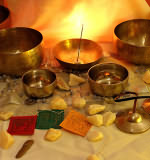| Töltsd le és telepítsd a nélkülözhetetlen betűtípusokat(s) Hogy megtekinthesd a Szanszkritot annak teljes fényében Olvass Transzliteráció (2) (magyar) hogy teljes mértékben átlásd a transzliterációs rendszert |
Tanulj Szanszkritul - GYIK1-Szanszkrit
Gyakran Ismételt Kérdések a Szanszkrit nyelvről - 1. Rész
Introduction
Since the e-mails coming to us are full of questions and false concepts about Szanszkrit, we had suddenly the idea of publishing a FAQ. We warn you that this page will be constantly and unendingly growing because it will be nourished with the questions asked by all of you. You can put any questions by e-mailing us, and as fast as possible we will answer them on this page --apart from the personal e-mail sent to you, of course--. New questions will be highlighted by a "N". Enjoy and learn!
Questions about Szanszkrit
Gabriel Pradīpaka answers your questions
Q: Does Szanszkrit come from India?
A: No. Szanszkrit was at the height of its splendor in India, but it really comes from the Indo-European tribes which, according to the latest studies, arrived in India coming from Eastern Anatolia peninsula (Turkey). On André's page about Origin of the Indo-European Languages all these Indo-European migrations are analyzed deeply. It is a common error to think of Szanszkrit as being born in India, but that is not so.
Q: Is Szanszkrit very difficult to learn?
A: Well, this a difficult question indeed! It depends on the teacher and the pupil. If the teacher does not know how to teach and/or the pupil does not know how to learn, of course Szanszkrit will be very difficult to learn. However, the teacher is lastly responsible for this. He should teach his pupils how to learn Szanszkrit.
Nevertheless, it is not true (at least in the beginning) to say: Oh, Szanszkrit is very easy, it will come to you spontaneously! If I would listen to someone telling me that, I would begin to think he wants to sell me something, you know. Of course, if you are already a Szanszkrit master, knowledge of this language comes to you effortlessly. That is true. But, to attain to mastery, you will have to strive for it. My Szanszkrit teacher told me: Szanszkrit grammar is hard to learn! And that is true when you learn it by means of traditional methods. That is why I have tried to improve my own teacher's method by using predominantly the computers. No doubt my pupils learn Szanszkrit much more easily than I did, but you know that all needs the corresponding effort.
In order that knowledge comes to you, you have to make an effort: little or big. My mission is to make things as easy as possible, but you will have always to strive to learn. The notion of people learning without any effort is great but false. Knowledge needs effort to be born and to live in you. For example, you have to come to our website, click on the links and read the contents to learn Szanszkrit. Well, that is your effort. Whether it is little or big, the effort is completely necessary to fully understand not only Szanszkrit but any other thing.
So, I tell you that Szanszkrit language is neither very difficult nor very easy. It requieres your striving for it, but the benefits are huge indeed.
Q: What is the point of learning Szanszkrit?
A: Very good question. Since we are surrounded with words, language is very important. We use words to talk to one another. However, such ordinary languages as English, Spanish, French, etc. are not accurate at all. For example, if you ask people about the meaning of the word "love", you would receive almost as many different meanings as responses. Those ordinary languages are not able to make people understand each other because their meanings are too ambiguos.
However, Szanszkrit is an accurate and scientific language. For example, in Non-dual Shaivism of Kashmir (a northern Indian philosophy), if you say "cit", you are referring to the Supreme Being in His static aspect as a witness; while if you say "citi", you are speaking of the Supreme Being in His dynamic aspect as this universe. There are many instances like that. You may say: "OK, but sometimes there are as many meanings of one word as philosophies". Yes, that is true sometimes. But, as for meanings there is a coherence within a particular philosophical system. Szanszkrit is just as mathematics, it is universal, coherent and consistent. This is a very important feature.
Most Indian Scriptures are in Szanszkrit. So, if you know Szanszkrit you will be able to read them directly. You will not need any translator at all. Those Scriptures contain immense spiritual knowledge. You will need this knowledge if you want to remove the ignorance. However, I am not saying: "Szanszkrit is the only spiritual language and only the Indian Scriptures can remove the ignorance". No, no, no. There are a great deal of Scriptures written in various sacred languages. But I just know Szanszkrit because my lifetime is short, you know.
Besides, the Szanszkrit sounds are very special...
Q: Why are they so special?
A: These sounds come from different levels of consciousness. So, we experience these levels when pronouncing Szanszkrit sounds. Every szanszkrit character has a relationship to a definite level of consciousness. Therefore, when pronounced we are connected directly to those levels. For example: since "u" is the letter of knowledge when a person pronounces it correctly attain to that level of knowledge. It is really simple. Go to First Steps (2) for more information.
Q: Are those levels of consciousness only the divine ones?
A: As a matter of fact, everything is divine because of its coming from the Divine One. Nevertheless if we interpretate "divine" as "high, spiritual", my response is "No". Some sounds such as: "pa", "pha", etc. come from mind, ego, etc. In short, they are the sounds made by the vibration of mind, ego, etc., and of course they are not high and spiritual according to the previous interpretation. At the same time, there are such sounds as: "a", "i", etc., which are really high and spiritual. They are uplifting and worthy of being pronounced.
Q: Do you encourage a person to learn Szanszkrit by heart? N
A: My response is no, never. Try to do it. First of all, you will have to study the alphabet and pronunciation... it looks like an easy job. Yes, it is rather easy. Afterward, you will have obligatorily to face the Rules of Sandhi (combinations). Well, the things are becoming worse now, aren't they? You will have to learn by heart 14 rules of Vowel Sandhi, 10 of Visarga Sandhi and even many rules of Consonant Sandhi are left. And these rules are the major ones. If you want to go deeper into verb conjugation and all that, you will have to learn a few minor additional rules. So, you will have to learn about 40 major rules of combination as well as a few minor ones (in case that you decide to study Szanszkrit grammar really in depth). Ah!, you have a strong intellect and finally could learn all those rules by heart. Well done!
Let us go on: After studying Sandhi, your next step is Declension. In Szanszkrit you need to decline nouns, adjectives, pronouns and numerals in order to give an structure to them. If they are not properly declined, they cannot be included in a sentence (Go to Declension). Since there are three numbers in Szanszkrit: Singular, Dual and Plural, you have 9 terminations. The problem now is the following: although it does exists a standard set of terminations, most sets generally differ from each other. Think of this: 9 terminations for nouns and adjectives ending in "a", 9 terminations for nouns and adjectives ending in "ā", 9 terminations for nouns and adjectives ending in "i" (and to make things worse, there are some changes if the noun or adjective is masculine, neuter or feminine) and a long et cetera. There are nouns and adjectives ending in "ī", "u", "ū", "ṛ", etc. Afterward you have nouns and adjective ending in consonant... ending in "at, vat, mat, in, an, etc.". You will have to learn by heart an immense quantity of terminations. And next you will have to learn "by heart" how to decline pronouns and numerals. Besides there are so many exceptions...my God!
Ah!, your intellect is really strong and brave, and you finally learnt all declensions by heart. You feel lucky... well, you will have to study Verbs now. If you did not die before, I can assure you that the Verbs will exterminate you once and for all, haha! You do not believe me? Go to Verbs and see by yourself. I do not think you can go through the Verbs by just using your memory. However, if somehow you are still alive after learning Verbs "by heart", Szanszkrit Syntax and Meter will end up destroying the rest of life in you, haha! Yes, yes I am kidding and exaggerating. It is funny. Joking apart, most people will not even be able to learn the Rules of Sandhi by heart, no to mention Declension or Verbs conjugation.
In ancient times (thousands years ago), people had a strong memory because they were really wise. Their entire behavior showed that wisdom residing inside them. Some of those sages could learn by heart thousands and thousands of verses after having listened to them for the first time. As they possessed wisdom and true knowledege of their relationship with the Supreme Being, their intellects and memory were strong and vast. However, nowadays the average person has both a fallible memory and a weak intellect. The reasons for this are the following:
(1) That person thinks erroneously. He considers himself to be a human being that lives here or there and all that. He does not think of himself as Śiva. He does not feel "I am Śiva, I am the Divine".
(2) From the erroneous thoughts and concepts referred to, a likewise erroneous way of living is the obvious consequence. Almost all people live without thinking of their relationship to the Divine. They are only thinking about how to earn more money, how to resolve a family problem, how to pay a bill and so on. After a few years, they finally die and maybe realize that they forgot "something", hehe! Yes, they forgot the most important thing in the entire world: "To discover who they really are". If someone does not know who he is... well, he is like a sleepwalker. All the actions of such a person are insignificant because he is "absent". This is subtle. Try to grasp it.
So, the solution is not to go to a mountain and abandon "all" in the process... not at all! The solution for such "empty and vacuous" life as that one is to add "spirituality" to it. If there is no spiritual development in a person, the whole life seems to make no sense: one is born, grows up, has a few problems, pays a few bills, gossips for a while, one or two children, pain and dissapointment,... , and finally dies. No sense at all from a mundane viewpoint, if one ponders deeply over it. The sense is that you have to experience all that as a spiritual learning. Spirituality gives sense to life. If someone lacks spirituality, he is bound to suffer over and over again. No Enlightenment, no final Liberation, no Bliss... a failure indeed.
A life without a spiritual unfoldment is like a meal without any salt. You do not have to discard the meal... just add salt to it. If you read attentively what I said, you surely noted that the first reason is the cause for all problems: "That person thinks erroneously". That is why the philosophical systems are necessary. All true philosophies teach people to think properly. If one person begins to think in a proper way, his life will reflect that.
Therefore, you have surely understood now that it is practically impossible to learn Szanszkrit strictly "by heart" at present.
Q: Sure, you convinced me. But, what is the way out for the average person? N
A: Yes, there is a way out. This universe is just as those films in which the main actor has to win in the end, hehe! Obviously, if you try to "tame" Szanszkrit language forcibly, you will undoubtedly fail to succeed. No, that is not the way. Remember what I said before: "That person thinks erroneously". Begin thinking properly about your Szanszkrit learning: Approach Szanszkrit with love and respect. Develop a loving attitude when learning this ancient language. And do not be in a hurry, please! Patience, love and respect is the key to learn Szanszkrit at this time, not a strong intellect and memory.
Q: What do you mean by love and loving attitude? N
A: By love and loving attitude I mean exactly that. Some people think that to feel love one necessarily has to cry or dance in rapture or run naked along the streets because so much love is in his heart or something like that, haha! Those behaviors could arise due to the emergence of love, but love is lastly an inner feeling. A simple example of love and loving attitude: "You begin studying Szanszkrit... you keep studying Szanszkrit.... you keep studying Szanszkrit... you keep studying Szanszkrit... you keep studying Szanszkrit for the rest of your life". That perseverance shows that a great love of Szanszkrit is behind. Stubbornness has a limit, but love has none. Maybe you do not cry or dance, but love is still there. That love and the respective loving attitude finally lead you deeper and deeper into the fathomless ocean of Szanszkrit language. And then you know that there is no end in Szanszkrit learning. It is as infinite as Śiva Himself.
If you are able to develop that perseverance, you will surely succeed because you will realize that the real joy and fulfilment lies in learning it endlessly. Nonetheless, if you have this attitude: "I want the fruits of my learning. I am learning to achieve something. I am in a hurry.", you will fail because no love is there, just a desire for fruits. Note that practically almost all your actions are to obtain "something". And that could be correct, to a certain extent, in the worldly life, but not in the spiritual one. As a conclusion: "love is synonymous with perseverance and absence of desires for fruits". If you have the last two, you have love and consequently Szanszkrit language is yours forever.
Q: OK. Let us suppose that I already have love, respect and a loving attitude. What is next? N
A: Interesting question. Practice is the following step. You take a paragraph in Szanszkrit and practice over and over again. For example, if you are studying Rules of Sandhi, you attempt to detect how those rules are being used in that particular paragraph. Of course, I will have to provide you with the "appropriate" paragraphs for you to practice, but you should investigate on your own steam too. It is essential to have an investigative nature for learning Szanszkrit. The ancient texts in Szanszkrit are the best "guru" for a person. That is why, I include fragments of scriptures every time I can. So, practice, practice and practice. Practice will allow the teachings to cast anchor in you.
Q: In your opinion, what is the "key" topic in Szanszkrit learning? Pronunciation, Rules of Sandhi, Declension, Verbs, Syntax, Meter, etc.? N
A: Of course, all those are really important but I would say that, according to my own experience, Sandhi is the essential component in Szanszkrit learning (Go to Combination). If you do not know how to "metamorphose" or transform a particular word so that it may be included in a formal sentence, you cannot write in Szanszkrit. In turn, if you want to translate a particular text, you will have to identify the original words in order to translate them properly. For example:
चिच्छक्तिः सर्वत्र भवति
Cicchaktiḥ sarvatra bhavati
Suppose you know all about Szanszkrit language except Rules of Sandhi. Well, you will say: Ah!, "sarvatra" means everywhere and "bhavati" is derived from the root "bhū" (to be, to become). So, "bhavati" is he/she/it exists or becomes. However, you cannot translate the word "Cicchaktiḥ" yet. You cannot find it in the dictionary. You know that a Visarga (ḥ) must be added to all nouns ending in "i" only if they are masculine or feminine. So "bhavati" is to be really translated as he/she exists or becomes ("it" is excluded, because there is no neuter gender here). What the heck does "Cicchaktiḥ" mean then? You think and think but do not understand how to translate that term. The key to translate it is the following:
As a matter of fact, "Cicchaktiḥ" is not an only word but it consists of two different terms. A particular rule of Consonant Sandhi states that when combined a word ending in "t" and word beginning with "ś", the conjunct "cch" must be substituted for both. That is: t + sh = cch. Voilá! Thus, the two original words are as follows: "cit" and "śaktiḥ". You take your dictionary and find that "cit" is Consciousness and "śakti" is Power. As I said before, you know that Visarga was furtherly added to "śakti" due to the gender. In this case, the gender is feminine.
Cicchaktiḥ = Cit + śaktiḥ = the Power of Consciousness.
So, the entire translation is: "The Power of Consciousness exists everywhere". That's it!
Note the metamorphosis:
चित्शक्तिः सर्वत्र भवति is transformed into चिच्छक्तिः सर्वत्र भवति
Citśaktiḥ sarvatra bhavati is transformed into Cicchaktiḥ sarvatra bhavati
Therefore, if you do not know Sandhi, you will not be able to write in Szanszkrit or translate. Obviously, the rest: Declension, Pronunciation, Verbs, etc. are likewise important. Still, I think Sandhi is the core and a unique feature of this ancient language.
to be continued
Further Information
Ezt a dokumentumot Gabriel Pradīpaka, a website egyik társalapítója készítette, aki spirituális guru és aki a Szanszkrit nyelv és a Trika filozófiai rendszerben jártas.
Szanszkrit, Yoga és indiai filozófiával kapcsolatosan, vagy ha csupán hozzászólni, kérdezni szeretnél, esetleg hibára felhívni a figyelmet, bátran lépj kapcsolatba velünk: Ez az e-mail címünk.





























